Let’s say you’re 55 and learned today that you’d definitely live to be at least 85.
That would be pretty good news, right? But what if you learned, at the same time, that you’d positively be in the 47 percent of the population over 85 that gets Alzheimer’s disease. Not such good news, you say.
Guess what? Chances are, as an American woman, you will live to be close to 85, according to life expectancy statistics from the World Health Organization. Sadly, there’s that ominous fact that in the living population, 85 and older, 50 percent have a chance of getting Alzheimer’s disease. Simply put, the longer we live, the greater our chance of getting this horrific disease that causes our brains to waste away. Since there’s no cure yet, this is a frightening fact, even if the grim prospect of affliction is decades away for you.
Happily, a breakthrough, non-invasive eye test may soon tell us, years before symptoms actually show up, whether we’ll likely get Alzheimer’s. Hopefully, it also will help the medical community to create a drug that can stop the progression of the disease once an early diagnosis  is made.
is made.
I had the privilege recently to interview the man who led the team that invented this test, Dr. Keith L. Black, Chairman and Professor of the Department of Neurosurgery, Director of Maxine Dunitz Neurosurgical Institute and Director of Johnnie L. Cochran, Jr. Brain Tumor Center at Cedars-Sinai Medical Center in L.A. I urge you to read every word. Besides giving you a straightforward, no-nonsense understanding of Alzheimer’s, the doctor explains if there’s anything we can do to attack the disease before it irreversibly attacks us and whether our little memory lapses are as innocent as our friends, relatives, and doctors say they are.
The interview unsettled me, but it gave me essential knowledge about a disease that has taken many of our loved ones for generations, is now taking many of our parents and is painfully close to taking many of us. It’s knowledge I think we all need to know. I hope you agree.

FOF: As simply put as possible, what’s the difference between Alzheimer’s and Dementia?
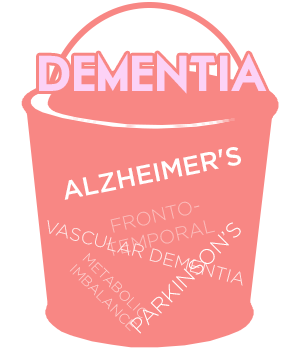
Dr. Black: Dementia is the big circle. It’s a characterization of laws of cognitive function from a number of different causes, including vascular dementia (micro strokes that can occur as we age); dementia related to other diseases, like Parkinson’s, which has a dementia component; frontotemporal dementia (reduced function in the brain’s frontal and temporal lobes, which control planning and judgment; emotions, speaking and understanding speech, and certain types of movement); dementia from metabolic states, such as a metabolic imbalance, which is caused by heavy metal intoxication, to dementia caused by Alzheimer’s. Of the entire bucket of dementias, the most common is Alzheimer’s, which makes up about 70 percent of people with dementia.
How many people are diagnosed with Alzheimer’s each year?
That number is increasing because the population is living longer. The best way to think about it is how many people at a particular age will actually have the diagnosis of Alzheimer’s, because it’s a function of age, which can be different in different countries, depending on life expectancy and other factors. The longer we live, the higher the number of people who will have Alzheimer’s at a particular age. By the time you’re 85 and older, approximately 47 percent will have a diagnosis of Alzheimer’s.

What about younger people?
At 65 and older, 1 in 8 people will have Alzheimer’s. We used to think about it when people became symptomatic. When we could do a memory test and say you lost so much of your cognitive function, we’d give you a diagnosis of Alzheimer’s.
We now know that this is a naive view because the disease probably starts 20 to 30 years before patients actually become symptomatic, not when they become symptomatic.
It’s more complex, so the best way to think about it is on a spectrum. First, there’s the presymptomatic phase, when all the pathology that’s developing in the brain is occurring; then the patient progresses to an early symptomatic phase, which we characterize as MCI (mild cognitive impairment), and, finally, he or she experiences enough cognitive decline to meet the definition of Alzheimer’s disease.
What happens in the brain at the different stages?
- During the presymptomatic phase, there’s a build-up of protein plaques in the brain, called a beta-amyloid, which are dense, mostly insoluble clumps of protein fragments. They leave a highly damaging substance outside and around the brain’s nerve cells.
- Then, about 10 years before becoming symptomatic, a patient starts getting neurofibrillary tangles (insoluble, twisted fibers that clog the brain from the inside-out), followed by inflammatory pathology in the brain, difficulty with connectivity within the brain, and then loss of brain cells.
- The brain is redundant, so as all of this pathology is beginning to build up, your brain cells are dying. If you start off with 100 billion brain cells, by the time you become symptomatic you’ve lost 40 percent of your brain cells (60 billion) and that’s when you get the clinical diagnosis of Alzheimer’s.
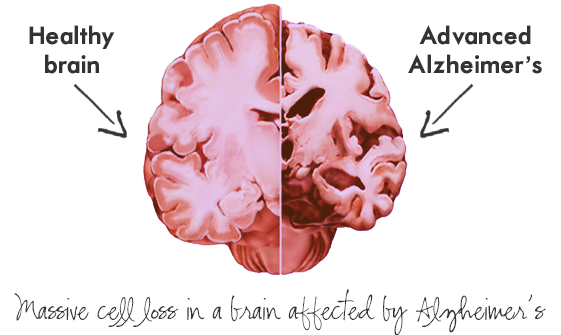
Please explain, in layman’s terms, what your new eye test will reveal.
NeuroVision Imaging, a company I co-founded with Steven R. Verdooner, has invented a noninvasive optical imaging system which appears to detect changes associated with Alzheimer’s disease with a simple eye test.
Since Dr. Alzheimer first described the disease in 1906, we’ve known that the buildup of plaque and neurofibrillary tangles were the hallmarks of the disease. A brain biopsy was the only way to determine this early on. Recently, PET scans have been a good way to look at the amount of plaque buildup in the brain, without doing a brain biopsy, but they are 80 percent accurate because you don’t have the best resolution. 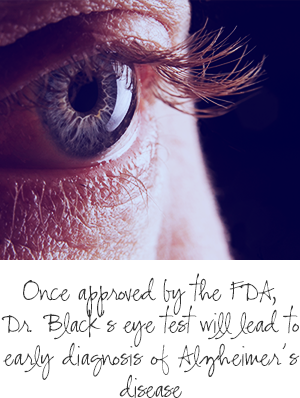 A spinal tap also can measure the amount of the toxic protein. Blood tests aren’t very accurate.
A spinal tap also can measure the amount of the toxic protein. Blood tests aren’t very accurate.
Then we have our retinal test.
The retina is an extension
of the brain, and so looking through the eye is like looking through a window into the brain.
The test gives us the ability to see plaque in very exquisite detail, down to individual plaque at about 20 microns, versus a couple of millimeters detected by a PET scan.
Preliminary results of 40 patients showed that beta-amyloid levels detected in the retina with the eye test were significantly correlated with beta-amyloid levels in the brain that appeared using PET imaging. The retinal amyloid imaging test differentiated between Alzheimer’s and non-Alzheimer’s subjects with 100 percent sensitivity and 80.6 percent specificity.
If your eye test shows plaque build-up, how accurately can you predict when a patient will become symptomatic with Alzheimer’s?
The retinal test will give us the amount of plaque that you have; the rate of the buildup of the plaque could be a very important predictor, as well. If the level of your plaque is stable, you may have a lower probability of progressing quickly then if your plaque is building up very fast. You have to repeat the test over time to see the progression of the plaque. We haven’t looked at patients long enough to YET understand the implications.

What’s the advantage of being able to diagnose the build-up of protein plaques in the brain years before we become symptomatic, when there’s no cure for the disease?
There’s a growing body of scientific evidence that lifestyle changes can slow down the progression of the disease, that aerobic exercise, for example, can decrease the build-up of these plaques.
If someone is 60 and learns she has plaque build-up, will it help to start exercising?
Yes, it will help to slow down the progression of plaque if you start an exercise program at 60, when you’re asymptomatic, and have 10 or 15 years before becoming symptomatic. There’s growing evidence that the earlier you start exercising, the greater the benefit.
Would you have the test before 50?
Yes, if you’re in a family with a strong genetic predisposition for early Alzheimer’s (before 65). Some people can develop it in their 40s and 50s.

When will your test be approved by the FDA?
We’re looking at getting FDA approval within a year. Unlike the long process to get a therapeutic drug approved, this is a non-invasive, safe diagnostic, so we’re looking at getting approval sometime in 2015, assuming we don’t get any delays from the FDA. At that point, doctors can start using the test and discussing the results with their patients.
When would your test be most beneficial?
The test would be beneficial throughout. When you’re 50, you can try to change your lifestyle. When you’re 70, you can start planning if you know you’re starting to develop the disease. Who is going to manage your estate, your financial affairs, who is going to be your caretaker?
Drug companies now believe that many of
their clinical trials to treat Alzheimer’s failed because they were treating patients too late, when they already had Alzheimer’s and lost 40 percent of their brain cells and half of their brain weight.
The probability of successful treatment would be greater if you could start it earlier. So the most exciting clinical trials now are looking for patients before they actually have Alzheimer’s, at the presymptomatic stage.
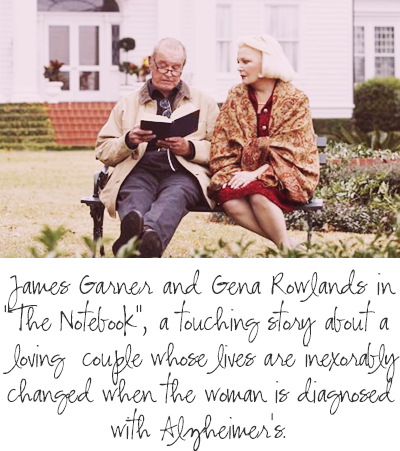
The only way to get into clinical trials now is to have a screen with a PET scan to detect amyloids, but it’s not easy to get to one, it’s expensive, it’s radioactive and it’s not reimbursed by the insurance companies. So it’s unlikely you’d get a pet scan at 50. But if you had an inexpensive, non-radioactive, non-invasive test, and you tested positive after having this screen, you could be a candidate for some of the newer trials with drugs to prevent the onset of the disease.
The new retina test also will be able to see if the plaque is going up or decreasing as a result of your lifestyle changes. If you can modify the bad thing that’s causing the disease, early enough, then that could make a difference. The unfortunate reality today is that Alzheimer’s is detected far too late for patients and their loved ones. Having an easy exam that can detect disease sooner will pave the way for earlier interventions with new therapies.
What other lifestyle changes could have a beneficial effect?
The Mediterranean Diet tends to confer a protective effect from Alzheimer’s. Omega 3 fatty acids (DHA) may be beneficial in clinical trials, according to a number of reports. Clinical trials are looking at the active ingredient, cumin, in the Indian spice curry, which may be beneficial. Coffee may be protective.
We don’t know what the maximum benefits can be, but if you assume the plaque build up is slow, and lifestyle changes (starting at 50) could decrease the accumulation by half, you would essentially get Alzheimer’s at 95, instead of 75. So you could live out your life without becoming symptomatic.
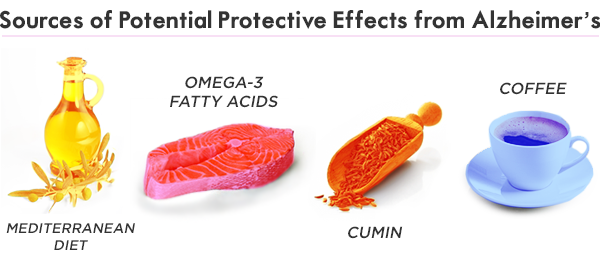
What puts you at greater risk for Alzheimer’s?
If you have one first degree relative, it doubles your risk of getting Alzheimer’s. The most common genetic test looks for the apoe4 gene. If you carry one gene, your risk is twice that of the rest of the population; two genes, your risk is four times greater. It’s a simple saliva test. The longer you live, the greater your chance of getting Alzheimer’s.
Are there definitive signs that you have Alzheimer’s?

By the time you have any symptoms you’re at the advanced stage of the disease. If you live long enough, everyone will get Alzheimer’s eventually. We begin to lose cognitive function at age 30, but the brain has a nice reserve, so a 30-year-old is going to be quicker in learning new tasks than a 65 year old. There’s the normal aging process and there’s the accelerated process that occurs with dementias. Anyone who isn’t functioning quite as well at work as they used to, not remembering as well as they did, those could be early signs. When we hit our late 50s or 60s, we’ll all moving to that phase when we could see early signs.
You may not be classified as clinically symptomatic (where you score at a certain level on the memory or cognitive test), but you could fall into the worried memory loss or subjective memory loss group, if you begin to worry about your memory, let’s say at around 60. That’s the phase right before you go into mild cognitive impairment. If you have memory loss events, it could be another kind of dementia, but it’s most likely Alzheimer’s.
Why do doctors tell you ‘that’s typical memory loss’ why you bring up a concern about your memory?
Most neurologists will ignore it or downplay it because they don’t really believe that they can do anything about it. Even if they believe you’re developing mild cognitive impairment, they won’t send you to have a PET scan and worry you because they don’t have a drug to stop it. They don’t want to have a difficult conversation with you and introduce the idea of making lifestyle changes.
Of what is a patient with advanced Alzheimer’s aware?
At the early stages, you know what’s happening. At the advanced stages, you’re probably not aware and probably don’t care. Patients at advanced stages become apathetic to the fact that they have the disease. At the advanced stage they most likely have lost cognitive function to the point that they don’t understand they have the disease. The emotional impact at that stage is not so much on the patient but on the family and on the caregivers.

So you really don’t know definitely what someone with advanced Alzheimer’s is thinking?
We don’t know that with absolute certainty because we can’t get inside their head because they’re so impaired. There are probably little flashes that they have the disease, but mostly no.
why do we die from Alzheimer’s?
The brain basically wastes away. Patients are bedridden, they aren’t able to eat or hold their secretions, so they end up dying from pneumonia or blood clots to the lungs and things like that.
Why is Alzheimer’s such a big concern for us today?
My grandfather lived on a farm and died at about 89. I don’t know if he had Alzheimer’s or not. Towards his later years, he had multiple generations around him. Grandpa would walk around, sit in his rocking chair on the porch, go back in and have dinner and watch a little TV. A couple of generations ago, life was very simple. We can’t live like that in current society. Most of us are out working, and would have to pay for caregivers to watch our parents with Alzheimer’s. We have things in our house that are very dangerous. You can’t make a phone call without really knowing how to use a smartphone. Life is very complicated. We use our brains now more than ever. The ability to live in this society, with cognitive impairment, is becoming much more difficult than it was 30 years ago.
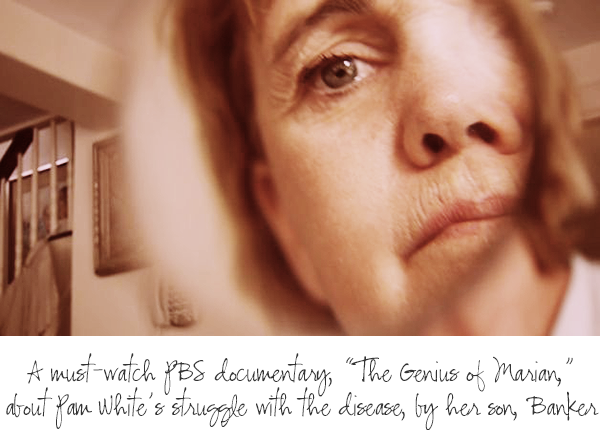
Do any of the brain tests and games that are heavily promoted on the internet help our cognitive ability?
Lumosity, probably not. Doing the New York Times crossword puzzle that you’ve been doing for 30 years, probably not. Engaging in mental activity that is different, outside your comfort zone, probably. If you’ve been terrible at languages all your life and you try to learn a foreign language at 70, that’s really good. If you’ve been terrible at music and now you try to learn to play the piano, that’s really good. What you really want to do is to increase connectivity between brain cells. Doing something that’s really easy for you, that you’re used to, like riding a bicycle, won’t do it.


0 Responses to “Are Your Little Memory Lapses Really As Innocuous As Your Doctor Claims They Are?”
patricia mullins says:
Geri, Very good article. My mom has 2 types of dementia. She has been in a nursing home for awhile and had this horrible disease for 10 years. Her sister and brother both passed away with it and younger sister has the early stages. My two sisters and myself are very concerned about our chances of having it. I will be looking for the new FDA approval of the retina test.
Tina says:
Thank you for sharing this information. I read it quickly here at work but could not watch God’s Gift at this time. I would be more than willing to take a noninvasive eye test that would tell me where I stand. Also the genetic saliva test mentioned looking for a specific gene. I feel with my diet and lifestyle I may be helping myself but know I should push myself to do more. I have a demanding job and that is the only way I get my brain cell workout (new and hard mental challenges). My mother had Alzheimer’s. I think she started having issues as young as 50. She used to tell me she knew what she wanted to say, it was on the tip of her tongue. My father was in denial of her condition until I took her in for testing. She did a good job of covering up her problem over the years and tried to do the same during the testing. During one of the tests they told her to write a sentence. After much hesitation, she wrote the word “sentence”. After the diagnosis, my dad turned to me and said “So what now. Can they give her a pill, cure it?” In other words, he didn’t see the point in testing where I wanted to be sure it wasn’t something we could correct. He saw the panic in my eyes and told me not to worry since I took after his side of the family. I pray he is right as they were/are hard working and mentally sharp to the end. This all happened many years ago before they had Alzheimer day care centers or homes that specialize in care of these patients. I read everything I could find concerning Alzheimer’s. I stopped using all commercial deodorants/anti-perspirants because they all had aluminum in them. I got rid of all my aluminum cookware and use glass pots and pans (still do). Aluminum was supposed to be a possible “bad” contributor. My father had to retire early to watch her. She almost burned the house down by leaving a pot cooking on the stove. She frequently locked herself out of the house and waited at a neighbor’s until my dad came home from work and then came in as if she was just visiting her friend. To this day I feel she killed him. Here was a proud WWII concentration camp survivor looking forward to retiring and traveling the country reduced to stubbornly caring for his wife by himself. He would not let anyone help but me-old world mentality-family takes care of family. I brought food, cooked, cleaned, did laundry and helped bathe her. My father felt he would die before her and made me promise to take care of everything as he could not trust my sisters to do so. So I became the next caregiver. As cold as this sounds, I feel he and I wasted large chunks of our lives. My husband would never care for me as my dad did for my mom. I have no children. I would not want anyone to have to feed and bathe me. I would rather be able to have my life ended than exist in that state. I’m all for learning and doing whatever possible to prevent or stall the decline as we age.
Geri Brin says:
Hi Tina,
Your comments touched me. I am right on your page about not wanting anyone to bathe me and feed me. I have repeatedly said that I fully intend to end my own life if I learn I am on a downhill slope with Alzheimer’s, or any other disease that I feel would negatively impact the dynamics of my life.
And, no, I don’t think you are being selfish to say you “wasted large chunks of your life,” especially because it doesn’t appear your mom even recognized what was being done for her and by whom.
I have two grown children and would never ask either of them to sacrifice their time, money or energy to care for me. Taking me out to dinner once in a while is one thing; having a mother who becomes a young child is quite another.
Stay well and thank you for spending so much time to read the article and to comment in such a caring and articulate way.
Fondly,
Geri
Pauline Durban says:
Wow, what an amazing article, time to start exercising again!
Geri Brin says:
Thank you, Paullne.
ali moss says:
Thank you Geri for this interview. It’s comforting to know that there is a simple but effective test on the horizon. I think doctors do us a disservice by downplaying memory loss concerns. I am surprised to learn that 70% of dementias are Alzheimers….now that’s scary. Personally, I worry about it all the time because my sister died of a stroke less than a week before she was to be tested for Alzheimers so I will never know if my chances are double for getting it or not. I suppose it goes without saying that giving up alcohol would
lower the risk factor…..I wish he had mentioned that as my
husband and I do like to share a bottle of wine occasionally.
Geri Brin says:
Hi Ali,
I am sorry to hear about your sister. I checked if red wine is advised on the Mediterranean diet. Here’s what I learned:
Drink (red) wine during meals, but no more than three small glasses per day if you are a man and no more than two small glasses per day if you are a woman. So I assume you’re good if you only drink an occasional bottle with your husband.
I am definitely going to go back to doing some kind of aerobics, although exercise bores me to tears. 🙁
I think the doctor gives great advice in the last answer about challenging your brain with new things.
Fondly,
Geri
Catherine says:
Geri, that was an excellent article. Thanks
Geri Brin says:
you are welcome, catherine. and thank you for telling me you thought so.
g.